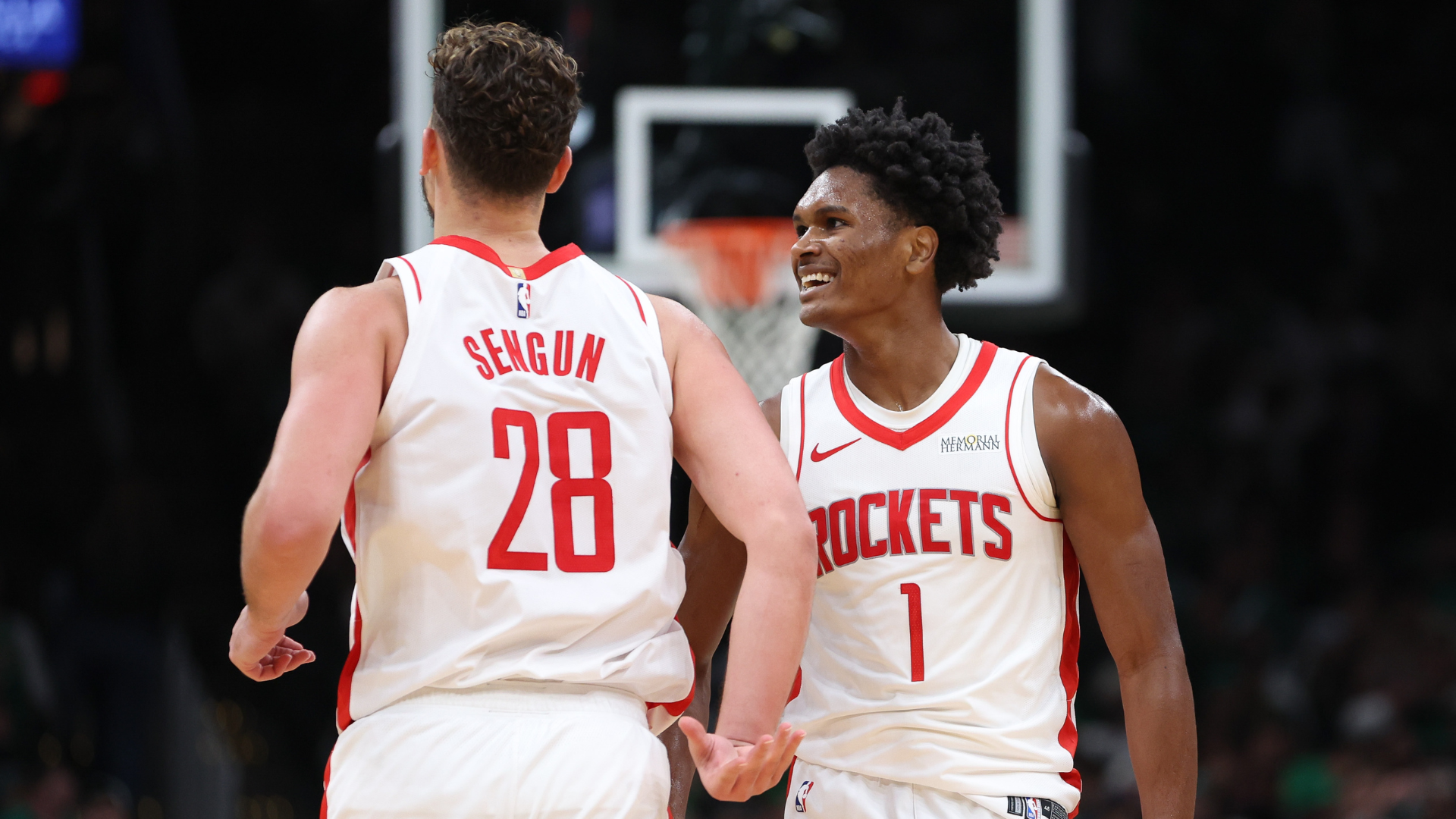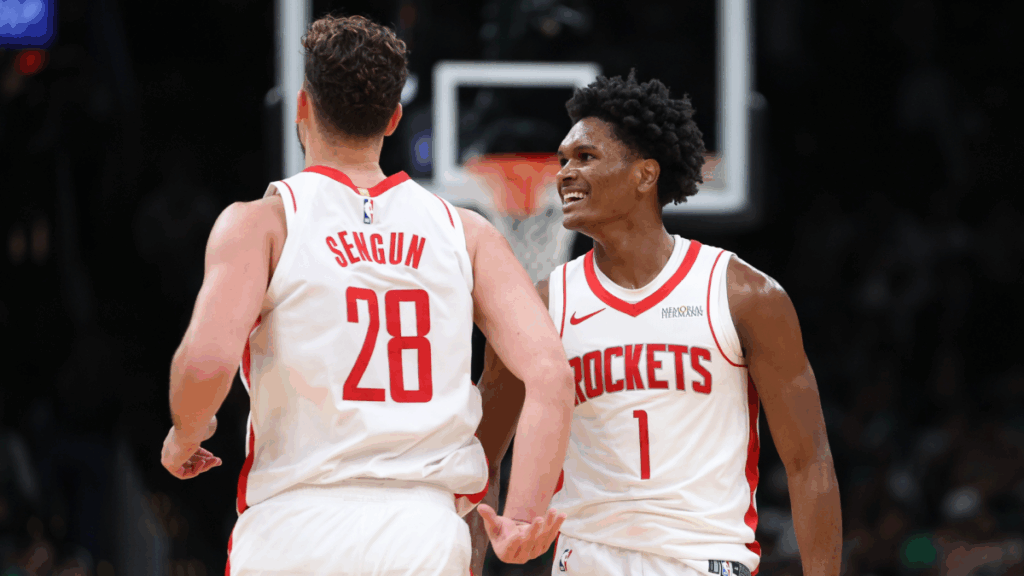
Sometimes multiple things can be true at once. When Fred VanVleet went down with a season-ending ACL injury before a game had been played, it was an undeniable blow to the Houston Rockets. The Rockets were already short in the ball-handling and shot-creation department, not to mention that losing FVV also docked them a capable scorer and veteran presence.
But that unfortunate turn of events also forced Houston to adapt. Maybe they don’t have an obvious traditional point guard and that certainly complicates matters, but head coach Ime Udoka saw the situation as an opportunity. Shortly before the season started he pointed to Houston’s significant size as a potential advantage and figured there would be nights when they doubled down on “bully ball” — putting the ball in the hands of 6-foot-7 hyper-athletic Amen Thompson alongside Kevin Durant, Jabari Smith Jr, Alperen Sengun and Steven Adams, all of whom are 6-11.
Lately, the Rockets have opted to start 6-foot-4 Josh Okogie in place of Adams, giving them a more versatile perimeter defender. (Those two units are their only five-man combinations to log 40 or more minutes together.) But with Adams, 6-8 Tari Eason and 6-10 Clint Capela available off the bench, Houston has a ton of big, disruptive bodies to throw at the opposition. Just five years removed from the diminutive Pocket Rockets, Houston has supersized its lineup.
While running double bigs has become increasingly fashionable in the NBA, the Rockets have leaned into a jumbo-sized roster better than most. Houston has won five of its last six games, including Sunday’s victory over Giannis Antetokounmpo and the Bucks in Milwaukee, where they had lost their previous six outings. The Rockets’ theory of the case has been pretty simple this season and Udoka summarized it nicely after beating the Bucks.
“If we get shots up, and get offensive rebounds,” he said, “we kind of wear on teams.”
That they do. In a league that prioritizes three-point shooting, the Rockets have chosen to zig where almost everyone else has zagged. They’re last in three-point attempts per game at 29.3 (but first in three-point percentage). Instead of the lack of distance volume spelling doom for their offense, they’ve tasked all those big bodies with crashing the glass. Houston is first in offensive rebounding and second-chance points and second in free throw attempts per game. As Udoka succinctly put it, they wear on teams. The unique formula has led the Rockets to a somewhat surprising No. 1 offensive rating. Couple that with them being eighth in defensive rating and that all works out to the Rockets having the third-best point differential in the league.
After the Bucks win, Udoka called out Kevin Durant and Alperen Sengun as being particularly effective. Durant went for 31 points (on 73.3% shooting) and seven assists, while Sengun had 23 points (on 66.7% shooting), 11 rebounds and seven assists. It’s a lot easier to play big when two of your giants are one of the greatest players of all time and a center who does stuff like this against Giannis, of all people.
Like everyone else, KD marveled about that play in his postgame interview. For the season, Sengun is averaging a career high in points, assists, steals, three-point percentage and free-throw percentage. Durant, meanwhile, leads the team in scoring and gives them the late-game closer they sorely lacked a season ago.
The early returns for Houston have been positive on the whole, but that does not mean the Rockets’ approach is entirely without its issues. Being large and in charge has mostly worked out, but without a reliable ball-handling guard it has also made the Rockets susceptible to turnovers. Udoka said taking care of the ball has been an emphasis for them all season, but in this case focusing on something isn’t the same as execution. Houston averages an eye-watering 17.6 turnovers per game. Only the Washington Wizards have been worse. That has caused problems for them, as it did in a loss to San Antonio over the weekend. The Rockets turned the ball over 23 times in that game, with Durant committing eight of them. Afterward, KD called their collective carelessness with the ball “contagious.” (Durant, Sengun and Thompson are averaging a combined 9.4 turnovers. Yikes.) So far, the Rockets have been able to overcome their sloppiness, but it’s something that’s on everyone’s radar.
“We lost our PG,” Sengun said on Sunday. “Everybody is trying to do that now. Amen is trying to do some stuff. KD is doing some stuff. We’re going to get better on that. As a new team, we’re going to get better and better on that. If we want to win, we need to take care of the ball.”
The turnovers are an obvious byproduct of the roster construction and how they’ve chosen to play. Without FVV leading the way, the Rockets have deployed Point Amen. When he has the ball and he’s pointed at the basket, he’s a marvel.
But it also asks a lot of a young player who is being charged with doing a lot of things on offense, not to mention generally drawing the toughest defensive assignment on most nights. The other backcourt option is Reed Sheppard, who at 6-2 is their smallest rotation player. After a slow start to the season, he’s been much better in his last two outings — especially against the Bucks, when his active hands on defense and sharp shooting were critical components of Houston overcoming a double-digit deficit in their second-half comeback. For all his outsized talent, this is still just Thompson’s third season, while Sheppard is getting more regular rotation minutes after largely being an afterthought in his rookie campaign. Put another way, the duo is learning on the job.
“It’s not all going to be perfect,” VanVleet said recently when asked about the duo. “We don’t want to be perfect in October and November. We want to be great at the end of the season. I think we just find some aggressiveness, some chipiness, a little bit of fight. Amen has obviously been himself. He’s trying to wear a lot of hats and do a lot of different things. It’s all going to be a work in progress. Both of those guys are students of the game and two of the hardest workers I know. There’s no way that they can fail.”
There’s a lot to like about both Thompson and Sheppard, though it might make sense if the Rockets gave them some help in the backcourt and added an established guard at some point before the trade deadline. As FVV said, the Rockets are still figuring things out in that department, but maybe getting those two comfortable now will have them primed later when Houston (along with the rest of the loaded Western Conference) hopes to make a postseason push. But for a team still working out some kinks, the Rockets at least know who they are, how they want to play, and that their style can work.


